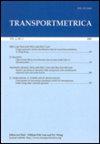Service quality effects on air passenger intentions: a service chain perspective
引用次数: 50
Abstract
This study divides entire airline services into eight service stages and uses a second-order confirmatory factor analysis (CFA) to constitute service quality and to examine the causal relationships between two consecutive service stages from a service chain perspective. Two conceptual frameworks – overall framework and service chain framework are proposed. The former incorporates the constructs of service quality, sacrifice, servicescape, service value, satisfaction, switching barriers, and behavioural intentions combined with seven hypothetical causal relationships. The latter depicts seven hypothetical causal relationships between two consecutive service stages. The proposed models are validated by a case study of Spring Airlines, a low-cost carrier (LCC) based in China. The empirical results support all hypotheses except hypothesis 7 that service quality positively impacts behavioural intentions. Notably, test results for the interrelationships between two consecutive service stages suggest that a lack of satisfaction at a specific service stage will affect customer perception of the consequent service stage. Therefore, to improve the service quality for a service stage, the service quality of all upstream service stages must be improved first. This study also found that service quality has a large effect although not direct on behavioural intentions while sacrifice has the smallest effect. A low-fare strategy may not be effective when an airline fails to deliver high-quality service.服务质量对航空旅客意愿的影响:服务链视角
本研究将整个航空公司的服务划分为八个服务阶段,采用二阶验证性因子分析(CFA)来构成服务质量,并从服务链的角度考察两个连续服务阶段之间的因果关系。提出了整体框架和服务链框架两个概念框架。前者结合了服务质量、牺牲、服务逃避、服务价值、满意度、转换障碍和行为意图等结构,并结合了七个假设的因果关系。后者描述了两个连续服务阶段之间的七个假设因果关系。以中国低成本航空公司春秋航空为例,验证了模型的有效性。实证结果支持除假设7外的所有假设,即服务质量对行为意愿有积极影响。值得注意的是,对两个连续服务阶段之间相互关系的测试结果表明,在特定服务阶段缺乏满意度将影响客户对后续服务阶段的感知。因此,要提高某一业务阶段的服务质量,必须首先提高上游各业务阶段的服务质量。研究还发现,服务质量对行为意向的影响虽不直接,但影响较大,而牺牲对行为意向的影响最小。当航空公司无法提供高质量的服务时,低票价策略可能不会有效。
本文章由计算机程序翻译,如有差异,请以英文原文为准。
求助全文
约1分钟内获得全文
求助全文

 求助内容:
求助内容: 应助结果提醒方式:
应助结果提醒方式:


